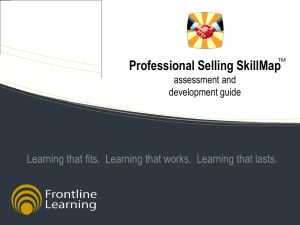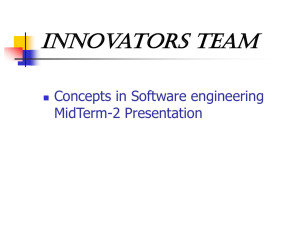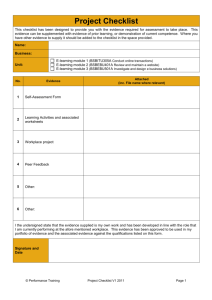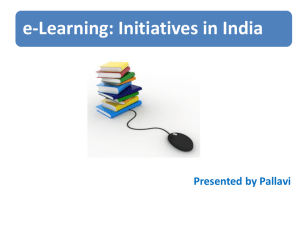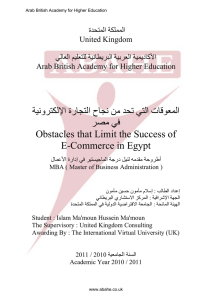Business Models for Evaluating E
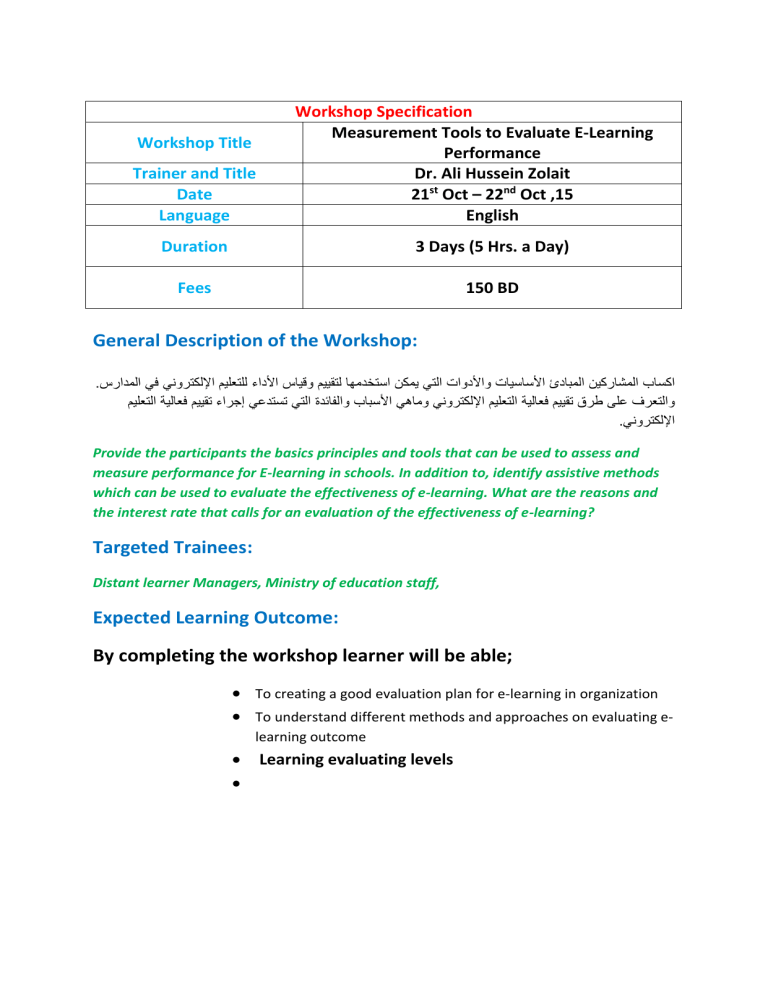
Workshop Title
Trainer and Title
Date
Language
Duration
Workshop Specification
Measurement Tools to Evaluate E-Learning
Performance
Dr. Ali Hussein Zolait
21 st Oct – 22 nd Oct ,15
English
3 Days (5 Hrs. a Day)
Fees 150 BD
General Description of the Workshop:
.سرادملا يف ينورتكللإا ميلعتلل ءادلأا سايقو مييقتل اهمدختسا نكمي يتلا تاودلأاو تايساسلأا ئدابملا نيكراشملا باسكا
ميلعتلا ةيلاعف مييقت ءارجإ يعدتست يتلا ةدئافلاو بابسلأا يهامو ينورتكللإا ميلعتلا ةيلاعف مييقت قرط ىلع فرعتلاو
.
ينورتكللإا
Provide the participants the basics principles and tools that can be used to assess and measure performance for E-learning in schools. In addition to, identify assistive methods which can be used to evaluate the effectiveness of e-learning. What are the reasons and the interest rate that calls for an evaluation of the effectiveness of e-learning?
Targeted Trainees:
Distant learner Managers, Ministry of education staff,
Expected Learning Outcome:
By completing the workshop learner will be able;
To creating a good evaluation plan for e-learning in organization
To understand different methods and approaches on evaluating elearning outcome
Learning evaluating levels
Topics to Be Covered:
1
Topic
The Value in E-learning
Evaluation
2
Perspective of Evaluation
3
1
2
Levels of Evaluation
Topic
Evaluation Approaches
Creating Evaluation plan
Day 1
Description
Why
Reasons
Objection
Good Evaluation
Economic
Timing
Internal
External
(L1)
(L2)
(L3)
(L4)
Day 2
Description
ROI
Costs and benefits
Viewpoint of both producers and consumer
Course Quality
Goals of evaluation
Schedule of Activities
Knowing Evaluation cost
What data will be used in evaluation
Who can provide it
Motivate participants
Day 3
1
2
3
Topic
Building Evaluation Into the
Development process
Pragmatics and
Professionalism
Evaluation Issues
Description
Identify business goals behind e-learning
Transit from business goals to learning goals
Set clear e-learning goals
Transform goals into objective
Stress concrete performance
Set all level of objectives
Measurement & Evaluation
Precision & Accuracy
Test assumption
Beyond the evaluation
Cost-effective
Evaluation of e-learning content development process
Evaluation of e-learning environment
Evaluation of e-learning at the program & institutional levels
Assessment Technique:
Practical Exercises
Training Resources and Materials:
Will be provided to Trainee during the sessions
Remarks:
ةرودلا ةياهن عم تاداهشلا عيزوت متيس
ةرودلا ىوتحملو رضاحملل مييقت لمع متيس
ينورتكللإا ملعتلا زكرم مساب ةيمسر ةلاسر لاسرا ءاجرلا ةقفاومل ا ةلاح يف
51994171 مقر سكاف ىلع يسابعلا ىفطصم روتكدلا
)
Translation to English)
Trainer Biography:
Ali Hussein Saleh Zolait is Assistant Professor of Management Information Systems and exVisiting
Research Fellow at the University of Malaya, College of Information Technology. He holds a PhD in
Management Information Systems from University of Malaya (Malaysia, 2008) and M.S in
Management Information Systems from International Islamic University Malaysia IIUM Central
Missouri State University (Malaysia, 2003). He has been involved for about 15 years in teaching, research, training, and/or consultancy in the areas of management information systems, technology acceptance, knowledge-based system management, computer applications, project management, spreadsheet modelling, systems analysis and design, Entrepreneurship and Innovation management science, advanced data Analysis and business research methodology. He is Editor-inChief of the
International Journal of Technology Diffusion (IJTD), IGI Publishing, USA. He is the author of the premier reference source: Internet Banking Acceptance: Perspective of User's Informational Based
Readiness, LAMBERT Academic Publishing, (Germany, 2012), 978-3-8465- 9814-6. He is the author/editor of the book Knowledge and Technology Adoption, Diffusion, and Transfer:
International Perspectives (2011), IGI Global, USA. Also, he is the author/editor of the book:
Technology Diffusion and Adoption: Global Complexity, Global Innovations. Assistant Professor Zolait has published more than 50 research papers that have appeared in international refereed journals & conferences
